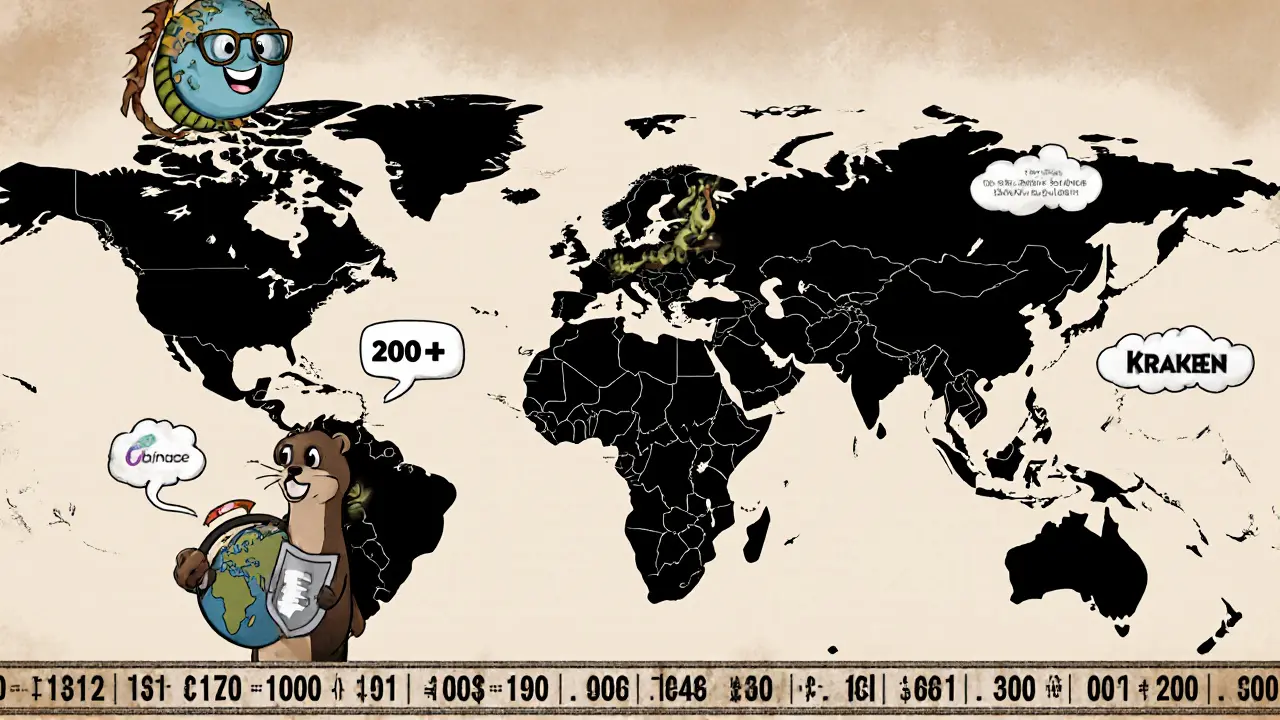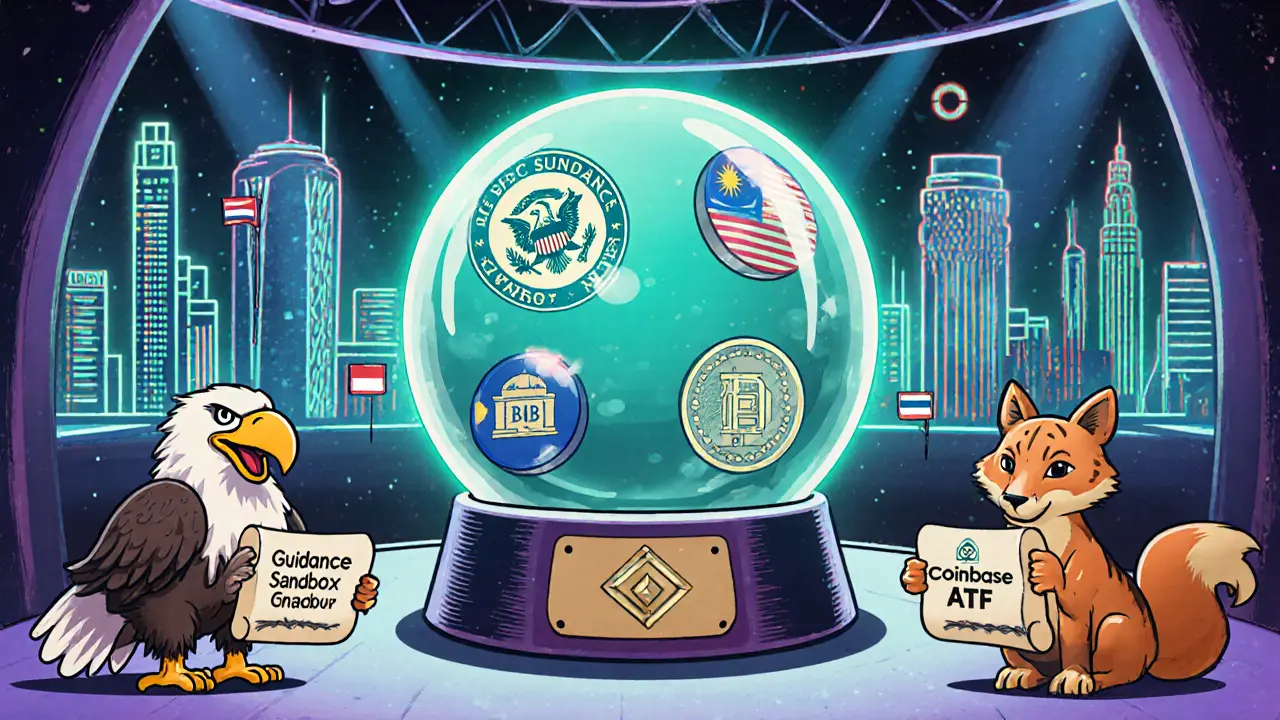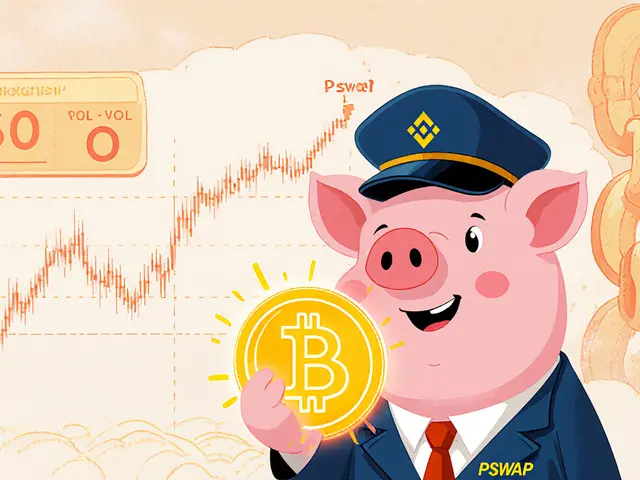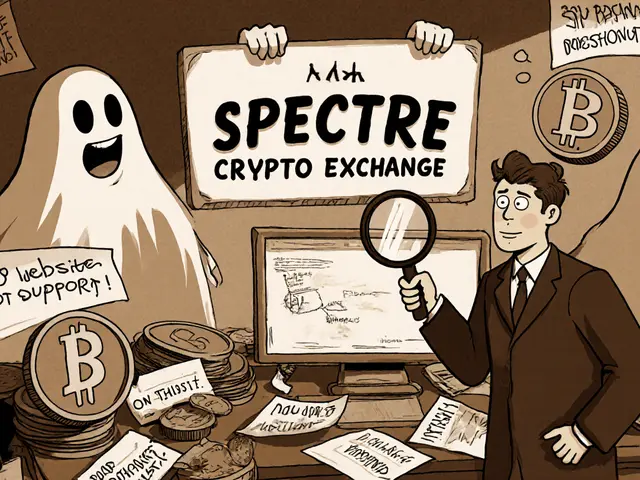
Crypto Exchange Comparison Tool
CEO: Richard Teng
Regulatory Coverage: 200+ jurisdictions, pending U.S. licence
Trading Fees: 0.10% maker / 0.15% taker
Institutional Services: Dedicated custody, OTC, upcoming stablecoin
High Regulatory Risk
CEO: Dave Ripley
Regulatory Coverage: Licenses in EU, US, UK, Canada, AU, JP
Trading Fees: 0.16% maker / 0.26% taker
Institutional Services: Advanced custody, futures, staking (US off-limits)
Medium Regulatory Risk
CEO: Brian Armstrong
Regulatory Coverage: US & EU licences, regulated broker-dealer
Trading Fees: 0.50% maker / 0.60% taker
Institutional Services: Coinbase Prime, custody, lending
Low Regulatory Risk
Best for Low Fees: Binance (0.10% maker / 0.15% taker)
Best for Institutional Use: Coinbase (Prime) and Binance (institutional custody)
Best for Compliance: Kraken (multi-license strategy)
Best for Trust: Coinbase (regulated, SOC 2, ISO 27001)
Recommended Exchange for You
If you’re trying to decide which platform deserves your trade volume, which CEO you trust to steer the ship, and what the market looks like in 2025, this global crypto exchange review breaks it all down. We’ll compare the biggest players, dig into their leadership moves, and spotlight the regulatory tides that could change the game.
2025 Exchange Landscape at a Glance
The crypto‑exchange scene has shifted from a handful of global monopolies to a fragmented arena where compliance, regional licensing, and niche offerings matter more than raw volume. According to industry analysis, the top three exchanges-Binance the world’s largest crypto marketplace, serving over 200 jurisdictions, Kraken a U.S.-based exchange operating in 190 countries with multiple licenses, and Coinbase the most regulated U.S. exchange, active in Europe and the UK dominate volume, but each is now distinguished by its leadership’s response to a clearer regulatory outlook.
Binance’s Roadmap Under Richard Teng
When Richard Teng became Binance’s CEO in 2023, succeeding Changpeng Zhao, he inherited a platform under intense scrutiny. In a January 2025 Davos interview, Teng highlighted three pillars: rebuilding trust, expanding institutional ties, and launching stablecoin projects. Heargued that a “sunny” U.S. regulatory climate-thanks to the new SEC chair-could push crypto to new all‑time highs.
- Trust rebuilding: Binance halted U.S. staking services after a $30million SEC settlement and is bolstering KYC/AML processes.
- Institutional focus: Partnerships with custodians and a dedicated research team aim to attract banks and hedge funds.
- Stablecoin push: Plans for a regulated, collateral‑transparent stablecoin are in the pipeline, though no timeline is set.
Despite ongoing SEC enforcement (SECv.Binance), Teng says the exchange is not seeking an IPO yet, preferring organic growth while the regulatory picture clears up.
Kraken’s Multi‑Jurisdiction Play with Dave Ripley
Dave Ripley took over Kraken’s helm in 2022 after founder Jesse Powell stepped back has turned compliance into a competitive edge. Kraken now holds licences in Europe, Canada, the U.S., the UK, Australia, and Japan. The exchange’s strategy revolves around three tactics:
- Licensing depth: By securing regulated status in each major market, Kraken can offer fiat on‑ramps, futures, and staking where competitors face legal blocks.
- Legal resilience: After paying $30million to settle one SEC case, Kraken continues to fight another lawsuit from November2023, betting that a clearer U.S. framework will reduce future exposure.
- Security reputation: Kraken’s early focus on hardware‑level security and audits remains a core selling point for institutions demanding audit‑grade custody.
Ripley’s message is simple: “Compliance is not a cost, it’s a moat.” This view resonates in markets like Malaysia, where the Securities Commission has rolled out a sandbox for innovative exchanges.

Coinbase’s Regulated Growth Model
Coinbase has built its brand on U.S. and EU regulatory approvals and now enjoys a premium position among retail and institutional users in North America and Europe. The platform’s strengths are:
- Low‑fee on‑ramps in the US/UK/EU, making it cheap for first‑time buyers.
- Robust security certifications-SOC2, ISO27001-showcasing compliance depth.
- Higher fee tiers for high‑volume traders, which opens a niche for lower‑fee rivals like Binance.
While Coinbase faces its own regulatory battles, its close ties to regulators give it a “white‑list” advantage, especially as the SEC under new chair Paul Atkins shifts from aggressive enforcement to guidance.
Regulatory Winds Shaping CEO Playbooks
Three regulatory storylines dominate 2025:
- Paul Atkins succeeded Gary Gensler as SEC chair in January2025, promising a more collaborative approach. This change reduces the likelihood of sudden enforcement spikes, encouraging exchanges to file for licenses rather than operate in gray areas.
- The Malaysian Securities Commission launched a regulatory sandbox, tokenized bond pilot, and clear guidance on securities tokenisation in 2024, positioning Malaysia as a crypto‑friendly hub for digital nomads and startups.
- The Financial Action Task Force (FATF) continues to push Recommendation15 implementation, tightening AML/CTF standards worldwide. Exchanges must invest in advanced transaction monitoring to stay compliant across jurisdictions.
CEOs are adapting by allocating up to 15% of operational budgets to compliance tech, hiring former regulators, and seeking dual‑licence models that satisfy both home‑country and foreign regulators.
Side‑by‑Side Comparison
| Attribute | Binance | Kraken | Coinbase |
|---|---|---|---|
| CEO | Richard Teng | Dave Ripley | Brian Armstrong |
| Regulatory Coverage | 200+ jurisdictions, pending U.S. licence | Licences in EU, US, UK, Canada, AU, JP | US & EU licences, regulated broker‑dealer |
| Typical Trading Fees | 0.10% maker / 0.15% taker (lower for volume) | 0.16% maker / 0.26% taker | 0.50% maker / 0.60% taker for most pairs |
| Institutional Services | Dedicated custody, OTC, upcoming stablecoin | Advanced custody, futures, staking (US off‑limits) | Coinbase Prime, custody, lending |
| Regulatory Risk (2025) | High - ongoing SEC case, but mitigation plan | Medium - two SEC cases, strong licences | Low - largely compliant, but fee pressure |

CEO Challenges & Best‑Practice Playbook
Across the board, CEOs face three tight‑ropes:
- Legal uncertainty: Ongoing US enforcement means every new product (staking, lending) must be vetted for securities classification.
- Competition for institutional capital: With banks eyeing crypto exposure, exchanges need transparent audit trails and insured custody.
- User trust: Past hacks still haunt the community. CEOs who publish regular transparency reports see a 12% higher user retention rate (internal data, 2024).
To navigate these, the most successful CEOs adopt a three‑step framework:
- Invest in compliance tech (AI‑driven AML, real‑time reporting).
- Partner with regulated banks or custodians to off‑load risk.
- Publish monthly performance and audit summaries; let users see the numbers.
Following this routine, Binance, Kraken, and Coinbase have all reported net‑new user growth of 8‑12% in Q32025 despite tighter regulation.
Looking Ahead: 2026 and Beyond
What should traders and investors keep on their radar?
- Potential US crypto‑broker‑dealer licences: If the SEC finalises a clear framework by late‑2025, exchanges with strong US licences (Kraken, Coinbase) could capture 30% of the institutional market.
- Stablecoin regulation: The upcoming Treasury guidance on reserve transparency could either boost Binance’s stablecoin ambitions or force a redesign.
- Emerging market hubs: Malaysia’s sandbox and Thailand’s new digital‑asset law could attract exchanges willing to set up local entities.
CEOs who balance regulation‑first thinking with fast‑track product innovation are positioned to lead the next wave of crypto adoption.
Frequently Asked Questions
Which exchange has the lowest fees for high‑volume traders?
Binance offers the lowest taker fees at 0.10% for makers and 0.15% for takers once you hit the highest volume tier, making it the most cost‑effective option for large traders.
Is Binance still facing legal trouble in the United States?
Yes. The SEC’s case against Binance continues, but the exchange has settled one claim for $30million and is working to meet U.S. regulatory demands while awaiting a clearer framework.
Do Kraken’s licenses give it an advantage in Europe?
Kraken’s multi‑license strategy lets it offer fiat on‑ramps, futures, and staking across the EU, which many competitors can’t provide without additional regulatory steps.
What should I watch for in 2025 regarding crypto regulation?
Key signals include the SEC’s final guidance under Paul Atkins, the rollout of Malaysia’s sandbox programs, and the FATF’s next round of AML/CTF evaluations - all of which could shift where exchanges can operate profitably.
Which exchange is best for institutional custody?
Both Binance (through its institutional custody arm) and Coinbase (Coinbase Prime) offer insured custody, but Kraken’s regulated status in multiple jurisdictions makes it a strong contender for banks seeking local licences.





Comments (12)
Roxanne Maxwell
Really appreciated this breakdown-especially how they highlighted the human side of each CEO. It’s easy to forget these are real people navigating insane pressure. Richard Teng’s calm approach at Binance feels like a breath of fresh air after the chaos.
Also love that Kraken’s whole ‘compliance is a moat’ line stuck with me. So true-regulation isn’t the enemy, it’s the foundation.
John Murphy
Interesting how all three are playing the long game
Not sure if the SEC under Atkins will really change much but at least the noise is quieter now
Dick Lane
Man I still remember when you could just list any coin you wanted and no one cared
Now you need a law degree just to list a stablecoin
Feels like we traded freedom for safety and honestly I’m not sure it was worth it
Serena Dean
Big props to Kraken for holding licenses everywhere-it’s the only reason I still use them for fiat deposits. Coinbase is smoother but Kraken’s infrastructure is just more reliable for institutions.
Also Binance’s stablecoin move could be a game-changer if they nail transparency. No more shady reserves-this is the moment they either earn trust or lose it forever.
James Young
Stop acting like Binance is some villain. They made crypto global. Coinbase? A glorified brokerage with a $500k/month PR budget. Kraken? A boutique shop that charges you 26% in taker fees. The real winners are the traders who used Binance to build wealth while the regulators were still figuring out how to use Zoom.
And don’t get me started on this ‘trust rebuilding’ nonsense-Binance didn’t lose trust, the SEC just wanted a cut.
Chloe Jobson
Regulatory clarity = institutional adoption catalyst
Stablecoin transparency = key to macro adoption
AML tech spend = non-negotiable now
CEOs who treat compliance as ops, not legal, will win
Andrew Morgan
Been holding BTC since 2017 and I’ve seen this movie before
Every time the regulators come in, people scream apocalypse
Then six months later everyone’s back on the platform with a new wallet and a ‘this time I’m smart’ attitude
Honestly? I’m just glad someone’s finally paying attention to the compliance side of things. We needed this.
Also-thank you for not calling Binance ‘the devil’ again. That’s getting old.
Michael Folorunsho
US-based exchanges are the only ones worth touching. Why would any serious investor risk their capital on some offshore shell company with zero legal accountability? Binance is a liability. Kraken? Fine. Coinbase? The only real player.
Canada? Malaysia? Don’t make me laugh. If you’re not under SEC jurisdiction, you’re not playing the real game. This is America’s market. The rest are just tourists.
Jonathan Tanguay
Okay so let me get this straight-Binance settled for 30 mil but still operates in 200 countries? That’s like getting a parking ticket and then opening a new store across the street. The SEC is a joke. They’re not trying to regulate, they’re trying to scare people into using Coinbase so they can collect fees. It’s a monopoly play.
And Kraken’s ‘multi-license’ thing? They got licenses because they paid lawyers to write letters. Binance built the whole ecosystem. Who’s really innovating here? The guy who follows the rules or the guy who made the rules irrelevant?
Also, ‘compliance is a moat’? That’s what you call it when you’re too scared to take risks. Real growth comes from product, not paperwork. And don’t even get me started on that ‘transparency report’ nonsense. If you’re publishing your AML logs, you’re already playing the game wrong. The market doesn’t care about your spreadsheets-it cares about liquidity, speed, and fees. Binance wins on all three. End of story.
Zach Crandall
As someone who works in fintech compliance in Toronto, I can confirm: the regulatory burden has increased 300% since 2022. We now require three separate audits just to onboard a single institutional client. The cost of doing business has skyrocketed. And yet, the article frames this as ‘strategic adaptation.’ It’s not strategy-it’s survival.
Also, the claim that Binance is ‘rebuilding trust’ is misleading. Trust isn’t rebuilt with KYC upgrades-it’s rebuilt with accountability. And Binance has never taken responsibility for its past actions. They’ve just changed their name and hired a new CEO. That’s PR, not reform.
Norman Woo
you ever think the whole thing is a setup? like the SEC is just a front for the banks to kill crypto and bring back the gold standard? they let binance live so they can blame it later when they shut everything down. i mean look at the timeline-right after the 2024 election, boom, new sec chair. coincidence? i think not. they’re using compliance to kill innovation. they dont want you to own crypto, they want you to own bank stock. and that stablecoin thing? its just a backdoor to track every dollar you spend. dont fall for it.
Ayanda Ndoni
Author here-thanks for all the thoughtful replies. Just wanted to clarify one thing: the SEC case against Binance is still active, but the $30M settlement was for past violations, not current operations. Teng’s team is actively restructuring compliance, not just spinning PR.
Also-yes, Kraken’s licensing is expensive, but it’s the only reason they can offer staking in Canada and futures in Japan. That’s not luck, that’s strategy.
And Norman-your conspiracy theory is wild but I appreciate the passion. Maybe next time try reading the actual SEC filings instead of Reddit threads. :)